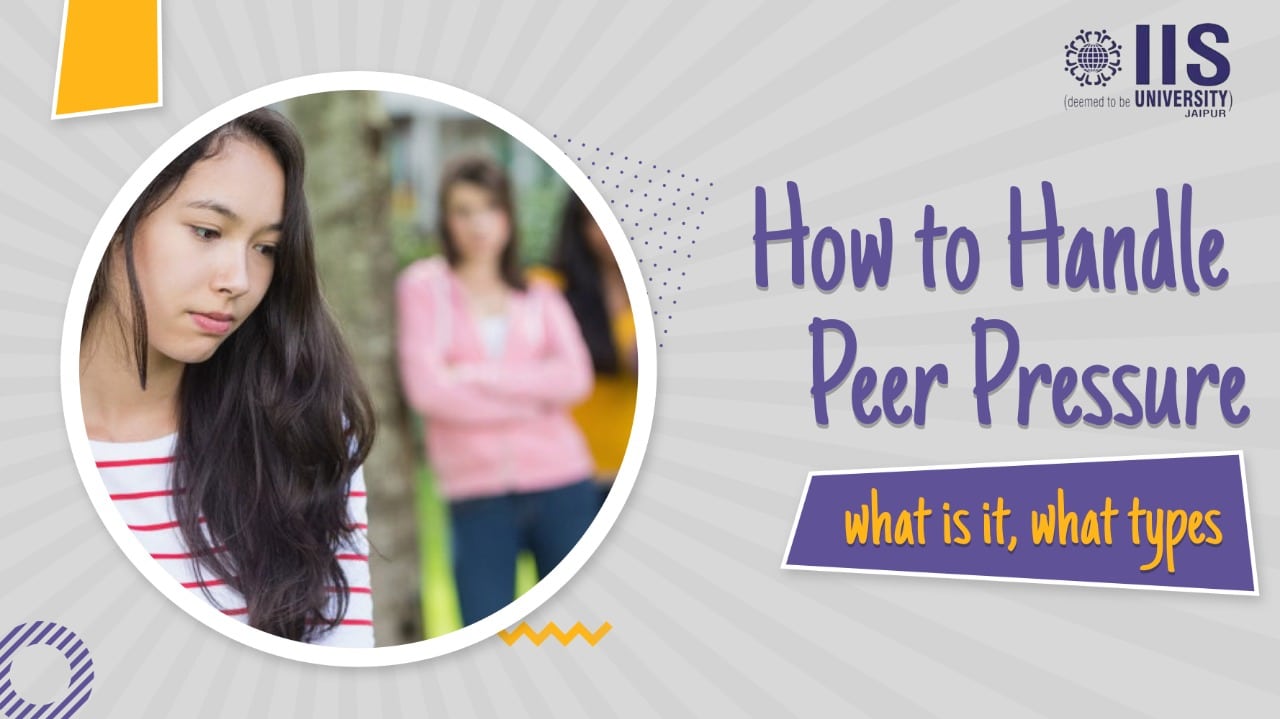Table of Contents
ToggleDo you often feel the stress of meeting the expectations of your peers?
Have you retreated from your social groups just because you fear the criticism and mockery you might face? We all know socialization is important and one of the critical factors for survival in this world.
We draw knowledge from our social circle, share our ideas and opinions with others, and even learn from them. But sometimes, social circles can instil negative thoughts or pessimism in an individual.
This is what we popularly call peer pressure.
In this article, we discuss Types of peer pressure, How to handle peer pressure and More facts about peer pressure.
Don't Know Which Career Option Is Best For YOU?
Get in Contact With our Expert Counsellors and Clear all Your Doubts.

Socialization and influence walk hand in hand. When you are involved with other individuals sharing the same thoughts and goals or believing in the same idea and concept, you tend to influence each other.
It can be seen through one’s actions or words. For example, let’s say you have befriended five senior students in your high school. But unfortunately, four out of five have a habit of drinking black coffee before the exam.
If you study with them for a couple of months, your circle can be considered a social circle or group. Since four of them drink black coffee before exams to clear their mind and get rid of sleep, 90% of the chances you are developing the same habit.
As it is black coffee, your social influence is still positive. However, your circle becomes toxic when this addictive object changes to drugs or alcohol.
The five seniors can easily keep a condition in front of you, stating that you have to start drinking alcohol with them to get accepted into the group. This is what we call peer pressure, where you come under the influence of your social friends to do something against your rational and practical judgment to appease them.
Of course, the peer is not just restricted to friend circles. Still, it includes every other group where the members have something in common like age, beliefs and opinions, occupation, education, culture, etc.
It is difficult to recognize or combat peer pressure, let alone overcome such a contradictory situation. Peer pressure is inevitable, and you can encounter it anywhere, from primary school to the workplace.
In very few cases, peer pressure can bring out the best in an individual, opening more opportunities for them. However, it’s not easy to identify peer pressure with positive effects from the ones that always come with pessimism and negative thoughts.
What Causes Peer Pressure?
You will not get influenced by the words or actions of other people involved in the same social group as you are as long as you resist the charm. Once you fall for their words or actions, there is no stopping you from experiencing the weight of reality and consequences.
Therefore, when we explain the causes of peer pressure, it is unfair to put the entire blame on your peers because you are equally responsible for feeling its intensity and gruesomeness. In this below section, we have listed some of the main reasons why you can feel peer pressure on your mind when you are involved with a social group.
1. Weak Personality:

How can you say you have a weak personality without anyone throwing the words at your face?
Now, this is a question almost every person avoids answering. But, according to a survey, people who face peer pressure usually have a fragile and vulnerable personality. When you are not confident in your actions or words or don’t rely on your beliefs and ethics, it’s easy to get confused and influenced by the presence of others.
Not being able to differentiate between the good and bad or lacking the courage to have a stand for yourself results in peer pressure. Instead of relying on yourself, you trust others and believe everything they say or do. It can result in a mental blockade where finding your stamina potentially becomes the hardest task in the world.
2. Social Acceptance:

90% of humans try to fit in a social community or group. For example, when students join high school, they tend to find groups with whom they can relate the most. Usually, the most popular groups or communities set some ground rules for every new member who wants to join for the first time.
If you come in contact with such a group and getting accepted into that team is your sheer desire, you must fulfill the criterion. You feel peer pressure when the condition forces you to do something against your liking or practical judgment.
Therefore, social acceptance can put an individual in a situation where they might have to perform certain activities to meet the conditions kept by existing members of the concerned group.
These conditions can be meager, like shortening the name or using some code names for addressing each other, or seeing where, like getting a brand or tattoo.
3. Bullying:

In schools and colleges, students feel peer pressure due to bullying. Although many institutes have antibullying cells or protocols, complete avoidance is impossible. Bullies usually force the weaker students who cannot take a stand for themselves or have a weak personality. They’re forced to do things that they don’t like.
Bullying involves physical violence, like beating someone up for not following orders. Students who encounter this kind of incident start fearing the bullies and either avoid them entirely or perform the tasks assigned to them forcefully. It eventually leads to intense mental pressure, causing many students depression.
4. Fear of Rejection:

Another major cause of peer pressure is the fear of rejection. It can be due to not having enough skills like other colleagues at the workplace or scoring fewer marks on the class test than the siblings.
Sometimes, fear can be deeply ingrained in a person’s characteristics, and fighting the anxiety becomes almost tricky. However, these people can go to any length to ensure they don’t face rejection.
In this case, peers do not explicitly put mental pressure on an individual. Instead, the individual’s weak personality, lack of self-confidence and self-trust, and over-anxious mind make them vulnerable to the constant fear of rejection. They think the only way to overcome this fear is to comply with everything the opponent party asks for.
5. Poor Parenting:

Studies have shown how poor parenting can sow the seeds of self-doubt, lack of confidence, aggression, desire to fit into any group or team, and so on. Combinedly, these factors result in peer pressure for children, teenagers, adolescents, and youth. In addition, children with poor parenting backgrounds fail to differentiate between right and wrong.
As a result, they complete the tasks assigned to them under the influence of others’ words and actions. With time, this compulsion leads to intense peer pressure that becomes too much to handle for any individual. Besides, if someone has terrible experiences during their childhood, they tend to trust others over themselves, falling prey to the influence.
6. Perfectionism:

The desire to become perfect is good because it forces you to give yourself 200% and get 100% in return. But when the desire becomes too much that you go to extra lengths to make yourself perfect in other people’s eyes, it leads to peer pressure.
People need to be perfect for themselves and not for others. You open the doorways to peer pressure when you let others define the statement of perfectionism for you.
In the long run, you will start feeling anxious until and unless you get an appreciation for being perfect from others. You may even forget everything else to achieve whatever you have been asked for and prove yourself as the so-called perfect person in others’ eyes.
In most cases, people completely disregard the fact that trying to bend one’s ways to fulfill others’ needs leads to serious mental pressure.
Types of Peer Pressure:
Although several types of peer pressure are prevalent, few can lead to serious negative consequences. However, if not treated at the right time, it can even lead to suicides, insanity, and full isolation from social groups. That’s why we have presented the most critical types of peer pressure that everyone should know.
- Spoken Peer Pressure: When someone asks you or suggests you do any activity one-on-one or within a group, it is known as spoken peer pressure. Here, you will get convinced to do the task being told at any cost, experiencing peer pressure from the beginning.
- Unspoken Peer Pressure: Unspoken peer pressure is a condition where you don’t get influenced due to someone’s words spoken directly in front of you. Instead, your mind and thoughts are impacted due to specific actions or choices others make.
- Direct Peer Pressure: In this condition, your peer directly communicates with you about adopting a new behavior or letting go of an existing one to fit the group or become famous.
- Indirect Peer Pressure: Here, you will get influenced to buy something you didn’t experience in the first place. For example, when you overhear others talking about you, you become anxious and feel peer pressure.
- Positive Peer Pressure: As the name suggests, positive peer pressure is considered when your social group members force you to take action for your benefit. The outcomes are positive and help you in many ways.
- Negative Peer Pressure: In negative peer pressure, influence from others makes you pessimistic. Anything that harms you and the people you love can generate peer pressure, from addiction to drugs to leaving education midway.
Peer Pressure Negative Effects:
There are a lot of consequences you have to encounter if peer pressure is not in your favor. These negative feelings can form humongous hurdles in your daily life, preventing you from living your life the way you want. Therefore, understanding the disadvantages of peer pressure is crucial for everyone.
> A Dramatic Dip in Self-Confidence:
One of the negative effects of peer pressure is a decrease in self-confidence. Let’s take an example to understand this in a better way. When you face repeated rejections from your colleagues or team leader at the workplace, you cannot have the same confidence level as the first time due to the fear of another rejection.
Because you don’t have self-confidence in yourself anymore, you do not play by your guts and comply with everything others say or ask. Even if they do something wrong, you try to make it right and feel the peer pressure.
> Depression and Anxiety:
Without any doubt, peer pressure leads to depression and anxiety. Constant exposure to this mental state can result in excessive stress and an anxious mind.
A slight slip from the regular process can’t leave you hyperventilating till you solve the situation and get appreciation from others. When you don’t find a way of escaping peer pressure, you start going into depression, insomnia, and palpitation.
> Trauma Coupled with Panic Attacks:
Sometimes, peer pressure can lead to mental trauma. For example, reencountering the same trigger results in panic attacks that can be fatal for your health. In addition, it can sometimes lead to thoughts like suicide, revenge, and self-harm.
> Impact on Studies or Work:
There is no doubt that peer pressure at schools and workplaces can lead to declining performance and productivity of an individual. You constantly worry about not being perfect in others’ eyes or not being able to complete a given task on time.
Due to the intense mental pressure, you lose focus and concentration from work or studies. As a result, your performance dwindles by a thread, and you fail to conjure up any idea to battle your incapacity in doing the work.
> Exposure to Dangerous Addiction and Habits:
When exposed to senior peer pressure, an individual can engage in dangerous addictions or behavior. Individuals can adopt addiction and other bad habits, whether it is due to the fear of getting bullied or acceptance.
This is perhaps one of the most severe impacts of peer pressure because the addiction is not just restricted to games or excessive chatting but also includes drugs and alcohol.
> Self-Harm or Suicides:
With being unable to handle the peer pressure or find a way to stand back and fight, many individuals take out the suppressed anger on themselves through self-harm. In extreme cases, it can often lead to successful suicides.
How to Handle Peer Pressure?
Handling peer pressure requires a lot of effort from your side. You are wrong if you think changing the social group or community can help you escape the situation. It comes from all directions and in the most unexpected manner. You cannot foresee where you will experience peer pressure or who will get involved.
Therefore, instead of running away or hiding, you should learn how to handle peer pressure and overcome it. Only then can you live a fearless life without being concerned about another repeat of the same events from the past.
Below are some ways to handle peer pressure and eliminate the mental suffocation and trauma you might face.
- Never lose self-confidence and self-belief, no matter what the situation is. If somehow you start losing faith in yourself, sit down and relax. Remember the days when you achieved something only because you were confident about your actions? Motivating yourself will help you maintain your confidence quickly.
- Do not wait for the relationships with your peers to become toxic. If you think their behavior or lifestyle is not up for you, or you must make sacrifices and adjustments to fit in the group, leave it instantly.
- Stand up for yourself, no matter what the consequences are. No one can take a stand for themselves. But, if you do not do it, people will continue to put more pressure on your shoulders, stopping you from enjoying life.
- Always speak out about your concerns, fears or phobias, and habits. When someone with good intentions listens to everything you have to say, you might get some good advice about how to deal with peer pressure all by yourself.
Facts About Peer Pressure:
- Peer pressure is not always negative. Sometimes it can be positive and might bring out the best in you.
- One of the significant causes of violence, self-harm, and suicide is peer pressure.
- Your activities or actions can never have a practical or rational definition when under peer pressure.
- Letting peer pressure get to your head can cause trauma and anxiety in the long run.
Conclusion:
Peer pressure is something every single one of us has to handle at some point in time. Being inevitable, running away from it is not an option. The only way to escape is to fight back and understand that staying alone is better than getting involved with a pessimistic and toxic social group. In addition, you should also learn how to control peer pressure and go on with your life as if nothing happened.
Read Also: Time Management Habits to Increase Your Daily Productivity

“The IIS University Team is a group of expert teachers and staff who are passionate about helping students learn and grow. They come from different fields but all aim to help guide the university’s students. They write these blogs to share their thoughts and ideas about learning and the importance of education. Their goal is to help students prepare for the future in a simple and understandable way.”
